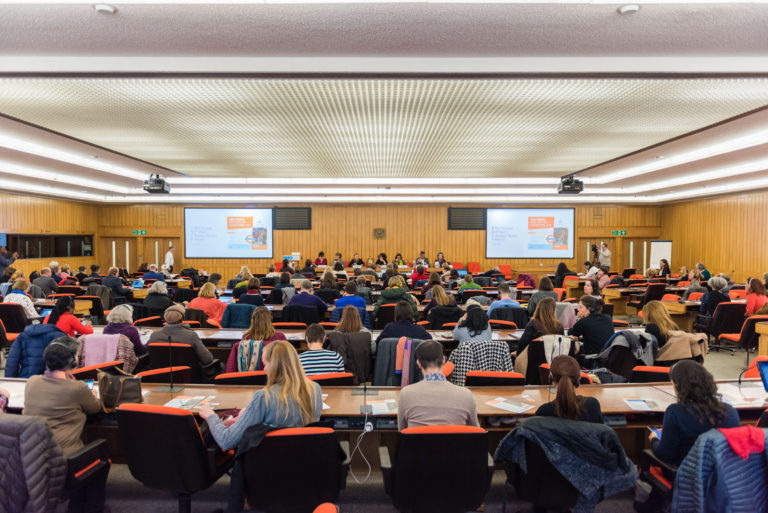
By Rob Davidson, MICE Knowledge
In London, on 12-13 January, over 170 professional conference interpreters from 20 countries gathered for an international meeting. But rather than being confined to their booths, interpreting the words of others, the interpreters took centre-stage at their own event, the interregional conference of the International Association of Conference Interpreters (AIIC).
AIIC is the only global association of conference interpreters, with over 3,000 members worldwide. Their London conference, which took place at the headquarters of the International Maritime Organisation, brought together the association’s members of the Private Market Sector (PRIMS) – those who work for national and international corporations, associations, ministries and private entities.
The evening before the conference, a welcome reception was held at the George Inn, one of London’s most famous medieval taverns, where I gave an opening speech on current trends in the conference industry.
Technological disruption
The presentations and discussions during the conference itself focused largely on how AIIC members can continue to offer their clients the highest standards of service, particularly in the current context of rapid technological innovations affecting conference interpreting. There was general agreement among delegates that just as technology has disrupted travel, accommodation, music, film, so too it is affecting the conference interpreting sector.
One of the most significant developments of recent years is Remote Simultaneous Interpreting (RSI), the technology-based system whereby rather than being located in the same room as conference speakers and delegates, the interpreters are ‘remote’ – operating from a distant site, which can be elsewhere in the venue or in another location altogether, in another country or in the interpreters’ own offices.
In response to growing interest in remote interpreting among AIIC members the Association recently released its Guidelines for Distance Interpreting, to provide minimum standards and best practice recommendations for professional interpreters and the conference industry.
Over the past few years, a number of commercial companies (several of whom participated in the London conference) have launched various RSI telecommunications platforms which provide this alternative to conference interpreters operating from booths located directly in the meeting room.
Benefits and challenges
Potential benefits for conference organisers were explored during the discussion: reduced equipment rental costs, and lower flight and accommodation expenses– this could open the market to companies and institutions that often do without interpretation services for budgetary reasons. Additionally, RSI gives a greater ability to schedule last-minute meetings with people in different parts of the world.
Advantages for interpreters were also highlighted: the use of RSI allows for a more flexible working schedule and reduces the travel-related stress from their professional routine.
Furthermore, there are potential wider benefits: reduced travel curbs the environmental footprint of the conference industry and could give people with physical disabilities better access to the profession.
But a key theme of the conference was how AIIC and its members can manage the challenges inherent in the use of RSI in order to guarantee the highest standards of service to their clients. This means providing consistently effective, high quality communication while managing the practical risks associated with the use of these systems.
The risks include anything from interruptions to communications due to power cuts or internet disruptions, to poor quality sound and visual input, to security and privacy issues.
The discussions also covered the relevant ethical and contractual issues, such as negotiating RSI assignments with clients while taking into consideration the appropriate ISO standards for simultaneous interpreting.
Interpreters must be involved
A clear conclusion of the 2-day conference was that while RSI seems here to stay, interpreters must not simply accept it without any criticism. They can – and should – be closely involved in the development process for this technology, identifying and advocating for the highest quality standards of RSI.
A step in this direction was taken at the conference itself, as the organisers had invited six different providers of RSI platforms to demonstrate their systems using the International Maritime Organisation’s own interpreting booths in the venue.
Delegates had an opportunity to test the platforms and give feedback to the companies.
The general opinion was that there is still much room for improvement in the functionalities of RSI platforms, and that technology providers and interpreters must work together to fine-tune these systems in the interests of all.
Innovations in interpreting technology – and in RSI in particular – are something that all conference organisers, meeting planners and venue managers need to understand, as they are slowly but surely in the process of transforming our industry.
At the end of the day, participants expressed their appreciation to PRIMS for opening up this discussion and including the providers. However, they stressed, much more dialogue between interpreters and other conference industry professionals is essential at this time.
Brexit
Brexit is certainly a point of concern of interpreters all across Europe, and the first presentation on Saturday, by veteran diplomat Boyd McCleary, covered the historical context and possible implications of the UK’s separation from the European Union. He painted a picture of a long and complex relationship between British politics and the European Union, culminating in the referendum decision to leave. The result has been a deeply divided nation, and the current failure to get agreement on a deal reflects this situation. McCleary referred to Prime Minister Theresa May’s proposal as a “Goldilocks deal”: too soft for the “leave” camp, too hard for the remainers. His prognosis was gloomy: constitutional crisis, economic decline, and negative knock-ons for the EU. As he concluded: “I wish I could offer you a message of support, but I’m afraid it’s a message of despair.”

![Cvent Announces Agenda for Annual Event and Hospitality Tech Conference: Cvent CONNECT Europe Cvent_(600×300)[1]](https://eventsbase.co.uk/wp-content/uploads/2023/09/Cvent_600x3001.png)


